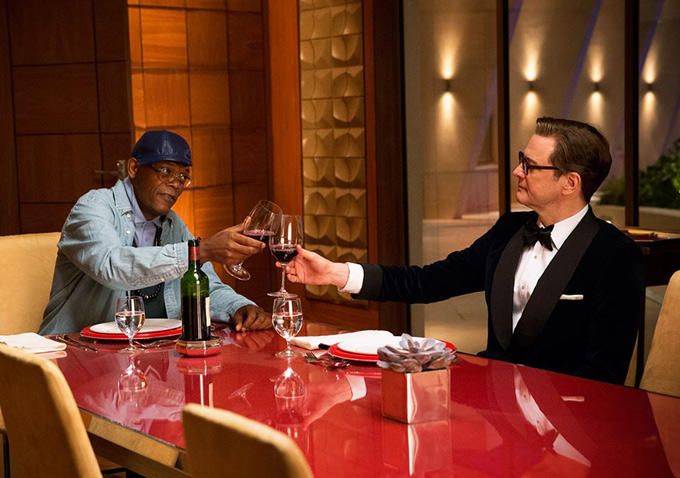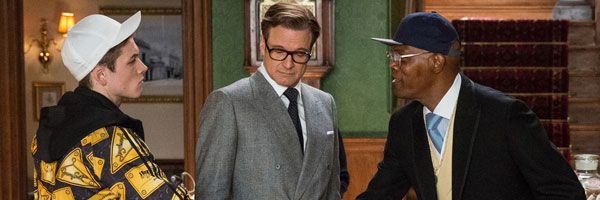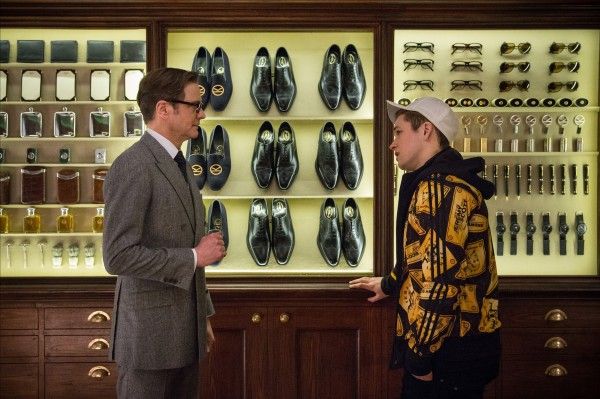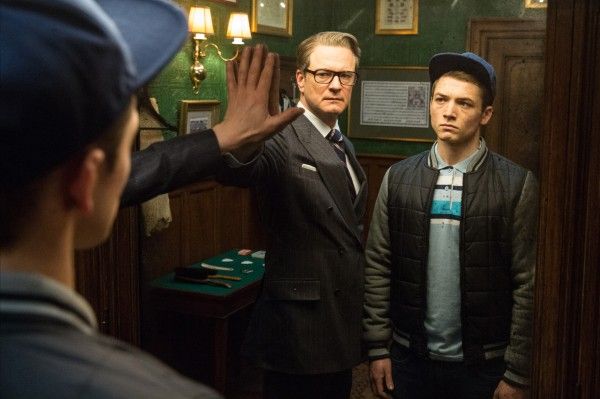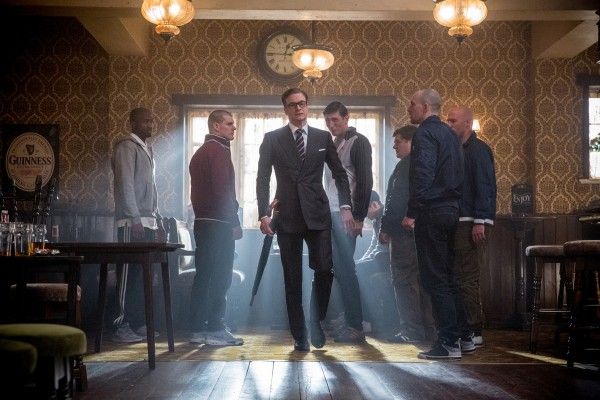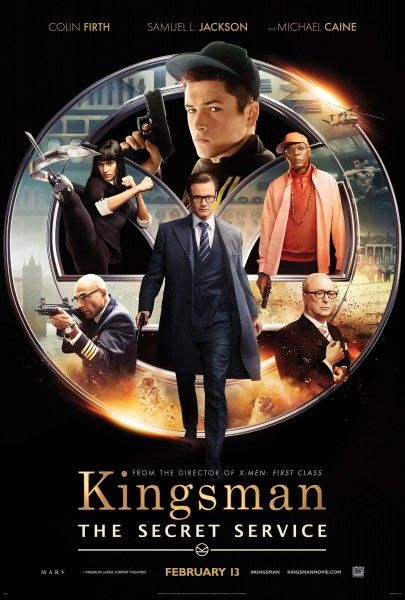Classic spy movies are where sophistication meets violence. There's a thrill in watching a refined gentleman tear up bad guys but never tearing his finely tailored suit. For its first half, Matthew Vaughn's Kingsman: The Secret Service enjoys playing the cultivated style of a classic spy movie against hard-knuckle violence, and the two bounce off each other wonderfully to create a delightful concoction that's funny, clever, and cheeky. But then the picture leaves the savoir-faire behind to engage in full-scale brutality that's treated as joyous but feels vulgar, especially when compared to the noble pursuits of gentleman spies.
Gary 'Eggsy' Unwin (Taron Egerton) is a good-hearted but reckless young man whose impoverished life lacks direction until he meets Harry Hart a.k.a "Galahad" (Colin Firth). Harry belongs to a secret, well-funded, elite group of cover operatives/modern-day knights known as "Kingsmen". Following the death of one of their agents at the hands of the speech-impeded, wealthy tech magnate Valentine (Samuel L. Jackson) and his razor-footed henchwoman Gazelle (Sofia Boutella), the Kingsmen need a replacement. Harry, owing a debt to Eggsy's deceased father, convinces the young man to apply for the position. But while Eggsy is training, the Kingsmen work to uncover and stop Valentine's nefarious scheme.
The first half of Kingsman is just about perfect. The film is fleet-footed, witty, and stylish. Egerton effortlessly exudes charm, and lets us know that this is a young star in the making. Firth is perfectly cast as he has both the dignity to ground the character, but also the subtle comic chops to play into the film's humor. The picture's ideal tone is captured when Valentine and Harry sit down for a meal of junk food and fine wine. They're two tastes that go great together, and while it's an unexpected meal, it's also one that turns out to be delicious.
Like he did with his previous adaptation of a Mark Millar comic, Kick-Ass, Vaughn is (to borrow a British phrase) "taking the piss" out of a genre. With Kick-Ass, Vaughn was tearing down superhero tropes by removing super powers, and while the film feints at "superheroes in the real world," it's really about ratcheting up the violence to mock its casual relationship to heroism in superhero stories. We think nothing of Batman playing vigilante and beating the snot out of people, and so Vaughn went with comic exaggeration by having a Batman kill a warehouse full of thugs.
Vaughn takes the same attitude with Kingsman to a point. Eggsy's training is ridiculous yet charming and stylish. The Kingsman's arsenal of weapons range from the traditional (poison-tipped oxfords) to the outlandish (cigarette lighters that are actually hand grenades). A finely tailored suit is bulletproof, and even if it wasn't, the characters carry themselves as if nothing could harm them. The movie is fun because it's smirking without ever coming off as condescending. Like Harry tells Eggsy, being a gentleman is about attitude rather than origin.
But then the attitude goes sour at a specific point in the film, and the way the movie turns made me put Vaughn's entire approach in doubt. While there were violent scenes earlier in the picture, they bordered on the supernatural with Gazelle chopping people in half with her razor feet or Harry deploying a bulletproof umbrella. Those things don't exist. It may as well be a superpower, and even though the result is bloody, it's also cartoonish. When Gazelle slices people up, the joke is punctuated by Valentine saying how much he hates the sight of blood. It's a sly nod at how supervillains in spy movies never do their own handiwork but still condone violent slayings.
Then Vaughn hits a particular scene, and I'm going to have to go into spoilers on why it moves the picture into a more muddled, less satisfying direction.
[BEGIN SPOILERS]
In the scene, Harry goes to investigate a church in Kentucky where all they preach is hate speech. We're meant to see that this is a church full of awful people.
Then Valentine reveals his plot, which is to have the free cell phones he distributed send out a brain wave that ups aggression and removes inhibition. This creates a horrifically violent scene where everyone in the church—including Harry—tries to kill each other. Naturally, Harry, who is a trained killer, takes out tons of people in a multitude of ways.
The scene is not played for horror. It's played for excitement as Vaughn plays Lynyrd Skynyrd's "Freebird", uses hyperkinetic camera work, and shows a variety of creative kills with Harry shooting, stabbing, and beating plenty of churchgoers to death. We're meant to marvel at the violent brutality because A) our hero isn't doing this of his own volition; and B) his victims were terrible people.
Except are they really that bad? Hate speech is despicable, but there's nothing in the scene to hint that these people would commit murder independent of Valentine's plan. They're not terrorists; they're not mercenaries. They're average people, and while their beliefs may be repugnant, do they deserve to die by getting shot in the face, stabbed in the head, and impaled in the mouth? Vaughn appears to take no shortage of pleasure in this mayhem. And by establishing the victims as "bad people", we're meant to enjoy it as well. There's no ambiguity at play or even a viewpoint.
The church bloodbath made me realize that we don't really know Valentine beyond his cartoonish persona. He's just as stylish at the Kingsmen, but in a completely different way. He has Jackson's cool confidence but mixed with a silly lisp. He's okay with the world tearing itself apart but he can't stand the sight of violence. He's supposed to be a man of contradictions, but these contradictions belie confusion. Is Valentine supposed to be from the streets like Eggsy, but thinks being a high-class is about being rich, powerful, and saving all the rich, powerful people from doomsday? Or was Valentine always rich, and he's part of the system that has no regard for the 99%?
(Side note: Valentine's plan is incredibly stupid. His idea that in order to stop global warming—the 21st century's version of nuclear annihilation—most of the world's population should kill itself, thereby reducing carbon emissions. Never mind the fact that all the rich and powerful people would be left with a world filled with rotting corpses and no economy. This is Valentine's idea of healing the planet.)
By shooting the church scene as something fun and exciting without providing a subtext for the villain's plan, Vaughn makes Kingsman shockingly nihilistic, and then the entire film rests on Egerton, who admirably manages to carry what's left of a vacuous picture. There are still fun moments, but they're guilty pleasures. It's like Vaughn was hit with Valentine's brainwave device and never recovered.
[END SPOILERS]
Before beating up a group of thugs, Harry tells them "Manners maketh man." It's all about having the right attitude. There's an odd sort of nobility that matches Eggsy's personality. He's a little rough around the edges, but he's smart and good-hearted. It's a movie about modern-day knights, and while the modern world may be crass and uncouth, that doesn't mean we have to lose a touch of class. The movie is a balancing act, but sadly, Kingsman ends up forgetting its manners.
Rating: B-

